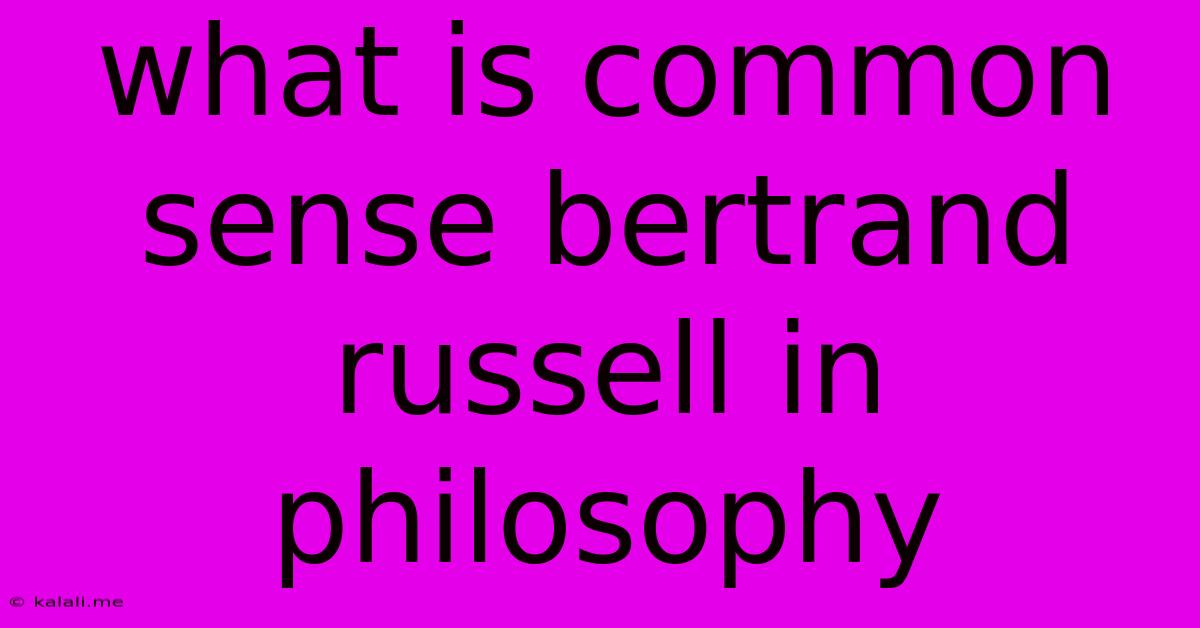What Is Common Sense Bertrand Russell In Philosophy
Kalali
Jun 05, 2025 · 3 min read

Table of Contents
What is Common Sense According to Bertrand Russell? A Philosophical Exploration
Bertrand Russell, a towering figure in 20th-century philosophy, didn't explicitly define "common sense" in a single, concise statement. However, his vast body of work reveals a nuanced and often critical perspective on its role and limitations in philosophical inquiry and everyday life. This article explores Russell's understanding of common sense, highlighting its strengths and weaknesses within his philosophical framework. Understanding Russell's perspective requires examining how he viewed knowledge, perception, and the scientific method.
Common Sense as a Starting Point, Not a Destination
For Russell, common sense served as a useful, albeit imperfect, starting point for philosophical investigation. He recognized that our everyday beliefs and intuitions, formed through lived experience, provide a foundation upon which more sophisticated knowledge can be built. This foundational role is crucial; it's difficult to begin philosophical inquiry without some preliminary understanding of the world. He saw common sense as a collection of beliefs widely accepted within a particular culture and time period, often based on seemingly obvious observations and everyday experiences. This includes beliefs about the physical world, human nature, and social interactions. Think of beliefs like "the sun rises in the east," or "fire burns." These are common sense observations which generally hold true.
The Limitations of Common Sense
However, Russell was keenly aware of common sense's limitations. He argued that relying solely on common sense could lead to significant errors. His critique centered on several key points:
- Subjectivity and Bias: Common sense is heavily influenced by cultural biases, personal experiences, and ingrained prejudices. What might be considered "common sense" in one culture could be utterly foreign or even nonsensical in another. This subjectivity makes it an unreliable guide for establishing objective truth.
- Inconsistency and Contradictions: Russell frequently highlighted the inherent inconsistencies within common sense beliefs. Many common sense notions, when examined closely, contradict each other or lead to logical paradoxes.
- Limited Scope: Common sense is fundamentally limited by our perceptual abilities and the scope of our everyday experiences. It struggles to grapple with phenomena beyond our immediate sensory grasp or concepts outside of our daily routines. Scientific discoveries often challenge and overturn common sense beliefs. For instance, the earth being flat was once a common sense notion, clearly disproven by science.
The Role of Scientific Inquiry
Russell strongly advocated for the scientific method as a superior means of acquiring knowledge. He believed that scientific inquiry, with its emphasis on observation, experimentation, and logical reasoning, could overcome the limitations of common sense. Science, he argued, allows us to move beyond the subjective and biased nature of common sense towards a more objective and accurate understanding of the world. This is not to say that science completely rejects common sense; rather, it refines and extends it, replacing intuitive beliefs with empirically verified knowledge.
Common Sense and Logic
Russell’s work on logic also informs his view of common sense. He emphasized the importance of logical consistency and rigor in philosophical thinking. Often, common sense beliefs lack the logical precision and coherence demanded by rigorous philosophical analysis. He saw logic as a tool to identify inconsistencies and flaws in common sense reasoning, leading to a more refined and accurate worldview.
In Conclusion:
For Bertrand Russell, common sense served as a necessary starting point for philosophical inquiry but not as a final authority on truth. Its inherent subjectivity, inconsistency, and limited scope demanded a more rigorous approach, provided by scientific inquiry and logical analysis. He viewed common sense as a useful tool, but one that needed critical examination and refinement to achieve a more accurate and comprehensive understanding of reality. It was a springboard, not a destination, in his philosophical journey.
Latest Posts
Latest Posts
-
How To Call Another Bat From Within A Bat File
Jun 06, 2025
-
Ditra Heat 15 Or 20 Amp
Jun 06, 2025
-
What Civilization Was The First To Practice Monotheism
Jun 06, 2025
-
Can You Leave A Hose On All The Time
Jun 06, 2025
-
15 Amp Plug On 20 Amp Circuit
Jun 06, 2025
Related Post
Thank you for visiting our website which covers about What Is Common Sense Bertrand Russell In Philosophy . We hope the information provided has been useful to you. Feel free to contact us if you have any questions or need further assistance. See you next time and don't miss to bookmark.